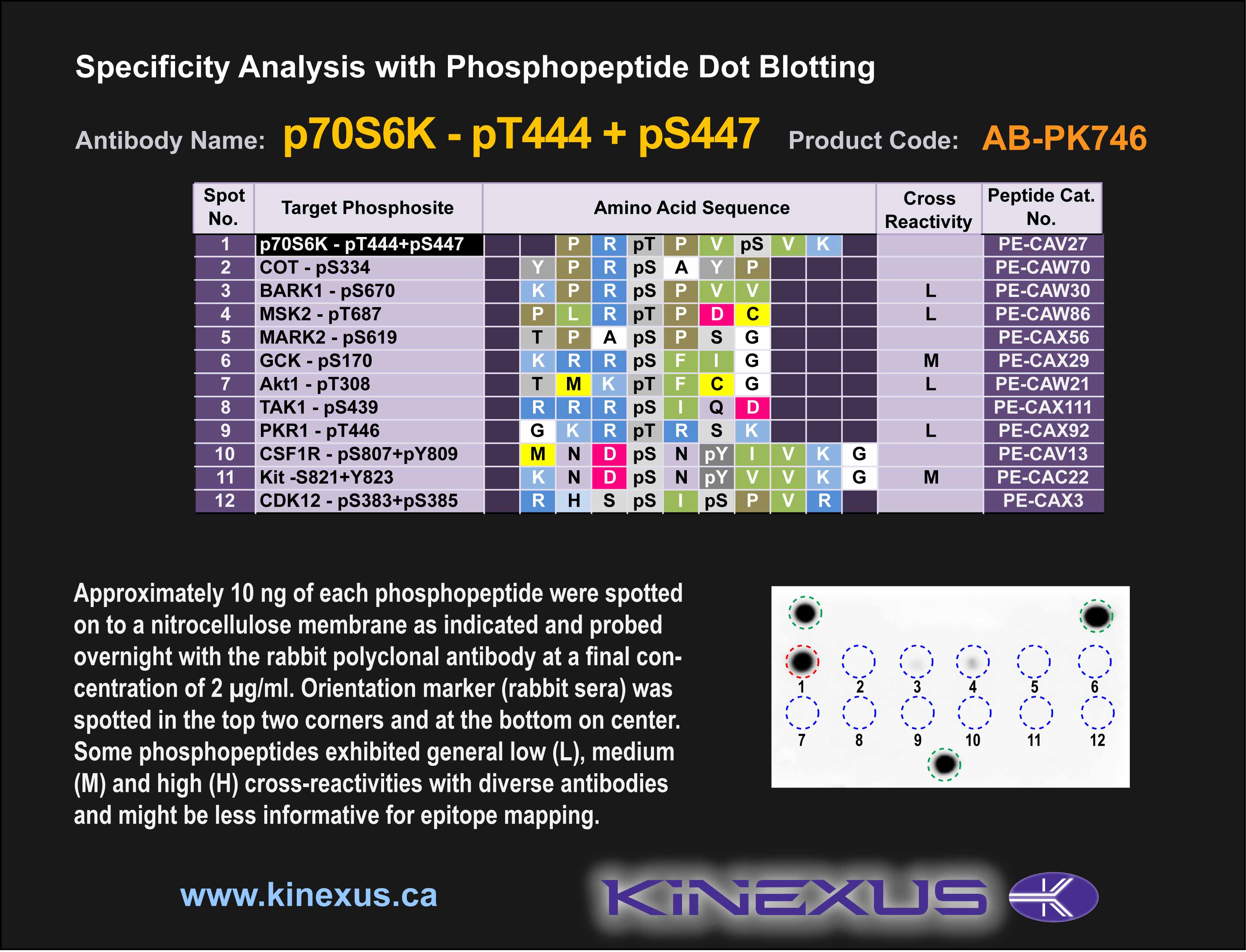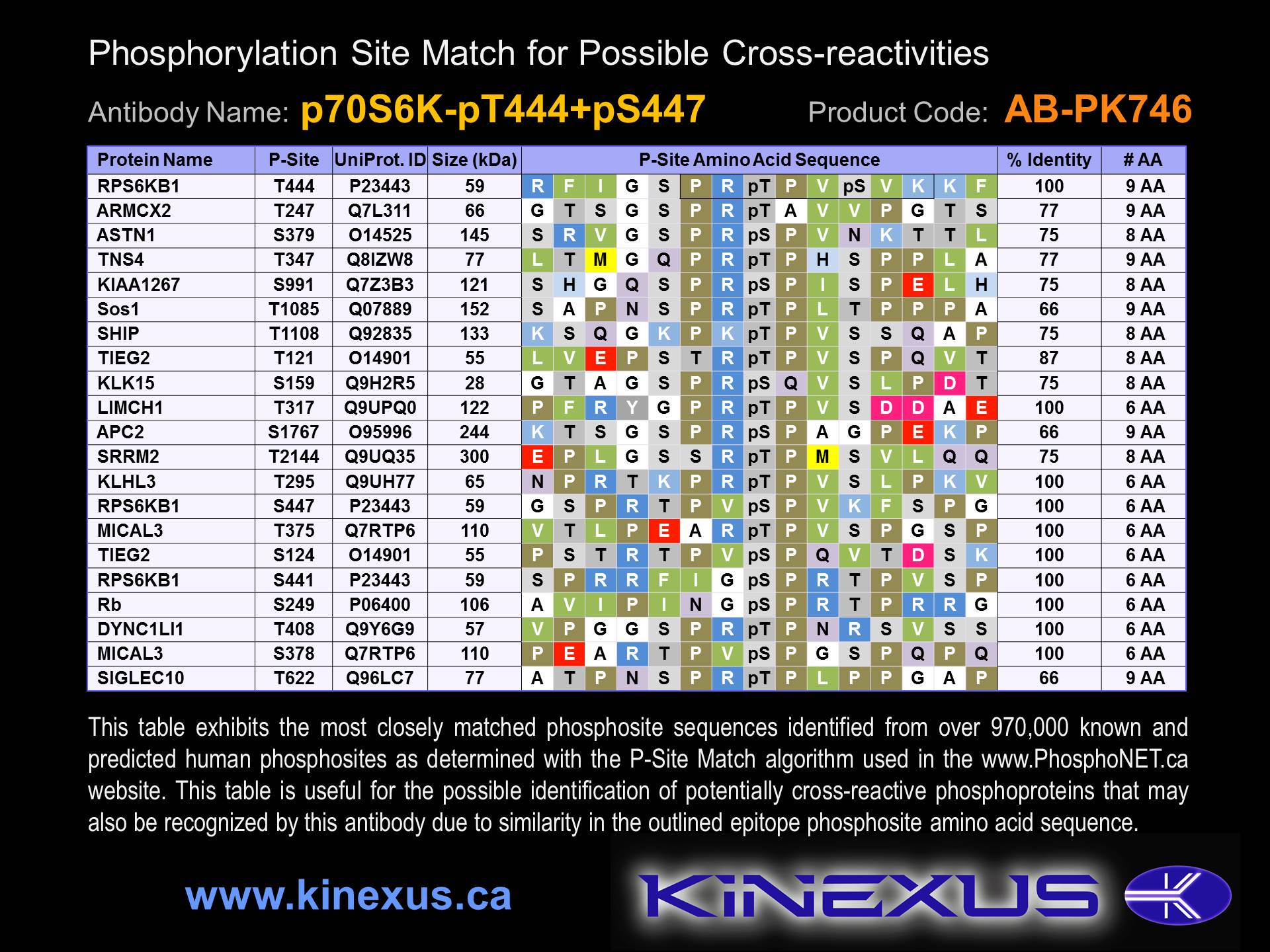Product Name: p70S6K-pT444+pS447
Product Number: AB-PK746
| Size: | 25 µg | Price: | 89.00 | |
| $US |
Target Full Name: Ribosomal protein S6 kinase beta-1; Ribosomal protein S6 kinase 1
Target Alias: RPS6KB1; KS6B1; Ps6K; p70(S6K)-alpha; Ribosomal protein S6 kinase I; RPS6KB1; S6K; S6K1; STK14A
Product Type Specific: Protein kinase phosphosite-specific antibody
Antibody Code: PK746
Antibody Target Type: Phosphosite-specific
Antibody Phosphosite: T444+S447
Protein UniProt: P23443
Protein SigNET: P23443
Antibody Type: Polyclonal
Antibody Host Species: Rabbit
Target Alias: RPS6KB1; KS6B1; Ps6K; p70(S6K)-alpha; Ribosomal protein S6 kinase I; RPS6KB1; S6K; S6K1; STK14A
Product Type Specific: Protein kinase phosphosite-specific antibody
Antibody Code: PK746
Antibody Target Type: Phosphosite-specific
Antibody Phosphosite: T444+S447
Protein UniProt: P23443
Protein SigNET: P23443
Antibody Type: Polyclonal
Antibody Host Species: Rabbit
Antibody Immunogen Source: Human p70S6K (S6Ka, RPS6KB1) sequence peptide Cat. No.: PE-04AGG95
Antibody Immunogen Sequence: PR(pT)PV(pS)VK(bA)C
Antibody Immunogen Description: Corresponds to amino acid residues P442 to K449; In the C-terminal third of the kinase
Antibody Immunogen Sequence: PR(pT)PV(pS)VK(bA)C
Antibody Immunogen Description: Corresponds to amino acid residues P442 to K449; In the C-terminal third of the kinase
Production Method: The immunizing peptide was produced by solid phase synthesis on a multipep peptide synthesizer and purified by reverse-phase hplc chromatography. Purity was assessed by analytical hplc and the amino acid sequence confirmed by mass spectrometry analysis. This peptide was coupled to KLH prior to immunization into rabbits. New Zealand White rabbits were subcutaneously injected with KLH-coupled immunizing peptide every 4 weeks for 4 months. The sera from these animals was applied onto an agarose column to which the immunogen peptide was thio-linked. Antibody was eluted from the column with 0.1 M glycine, pH 2.5. Subsequently, the antibody solution was neutralized to pH 7.0 with saturated Tris.This antibody was also subject to negative purification over phosphotyrosine-agarose.
Antibody Modification: Unconjugated. Contact KInexus if you are interest in having the antibody biotinylated or coupled with fluorescent dyes.
Antibody Modification: Unconjugated. Contact KInexus if you are interest in having the antibody biotinylated or coupled with fluorescent dyes.
Antibody Concentration: 1 mg/ml
Storage Buffer: Phosphate buffered saline pH 7.4, 0.05% Thimerasol
Storage Conditions: For long term storage, keep frozen at -40°C or lower. Stock solution can be kept at +4°C for more than 3 months. Avoid repeated freeze-thaw cycles.
Product Use: Western blotting | Antibody microarray
Antibody Dilution Recommended: 2 µg/ml for immunoblotting
Antibody Potency: Medium-strong immunoreactivity of a target-sized protein by Western blotting in HeLa cells. Very strong immunoreactivity with immunogen peptide on dot blots.
Antibody Species Reactivity: Human
Storage Buffer: Phosphate buffered saline pH 7.4, 0.05% Thimerasol
Storage Conditions: For long term storage, keep frozen at -40°C or lower. Stock solution can be kept at +4°C for more than 3 months. Avoid repeated freeze-thaw cycles.
Product Use: Western blotting | Antibody microarray
Antibody Dilution Recommended: 2 µg/ml for immunoblotting
Antibody Potency: Medium-strong immunoreactivity of a target-sized protein by Western blotting in HeLa cells. Very strong immunoreactivity with immunogen peptide on dot blots.
Antibody Species Reactivity: Human
Antibody Positive Control: The observed molecular mass of the processed target protein on SDS-PAGE gels is reported to be around 63-70 kDa.
Antibody Specificity: High
Antibody Cross Reactivity: No significant cross-reactive proteins detected in Jurkat cells. A >300 kDa medium cross-reactive protein was detected in HeLa cells.
Related Product 1: p70S6K-pT444+pS447 blocking peptide
Related Product 2: p70S6K-pT252 phosphosite-specific antibody (Cat. No.: AB-PK744)
Related Product 3: p70S6K-pT412 phosphosite-specific antibody (Cat. No.: AB-PK745)
Related Product 4: RPS6 (230-238) KinSub - 40S ribosomal protein S6 (K230-R238, human) peptide; p70S6K protein kinase substrate peptide
Antibody Specificity: High
Antibody Cross Reactivity: No significant cross-reactive proteins detected in Jurkat cells. A >300 kDa medium cross-reactive protein was detected in HeLa cells.
Related Product 1: p70S6K-pT444+pS447 blocking peptide
Related Product 2: p70S6K-pT252 phosphosite-specific antibody (Cat. No.: AB-PK744)
Related Product 3: p70S6K-pT412 phosphosite-specific antibody (Cat. No.: AB-PK745)
Related Product 4: RPS6 (230-238) KinSub - 40S ribosomal protein S6 (K230-R238, human) peptide; p70S6K protein kinase substrate peptide
Related Product 5: S6KASubtide - p70S6K (RPS6KB1) protein kinase substrate peptide
Related Product 6: GSK3b (3-12) KinSub - Glycogen synthase kinase 3-beta (GSK3b) N-terminus (G3-E12, human) peptide; Akt protein kinase substrate peptide
Related Product 6: GSK3b (3-12) KinSub - Glycogen synthase kinase 3-beta (GSK3b) N-terminus (G3-E12, human) peptide; Akt protein kinase substrate peptide
Scientific Background: p70S6K (RPS6KB1) is a protein-serine/threonine kinase that is a member of the AGC group of protein kinases in the RSK family, and p70 subfamily. This kinase is highly expressed and widely distributed in most tested human tissues except in the brain and spinal cord where it is more moderately expressed. It functions downstream of mTOR (FRAP1) signalling in response to growth factors to promote cell proliferation, growth, and progression through the cell cycle. p70S6K is activated by phosphorylation at T252 (by PDK1), S394 (by mTOR), T412 (by mTOR), S427, S434 (by ERK1/2), S441, T444 (by ERK1/2) and S447 (by ERK1/2). p70S6K is responsible for the phosphorylation of 40S ribosomal protein S6. It is activated by serum stimulation and this activation is inhibited by wortmannin and rapamycin. p70S6K phosphotransferase activity changes during the cell cycle, and increases 20-fold in G1 cells released from G0. It has been linked with the development of diet-induced obesity, colon adenocarcinoma and breast cancer.
Figure 1. Epitope mapping of p70S6K-pT444+pS447 antibody with similar phosphopeptides on dot blots.
Figure 2. Identification of phosphosites related to p70S6K-pT444+pS447.
© Kinexus Bioinformatics Corporation 2017



